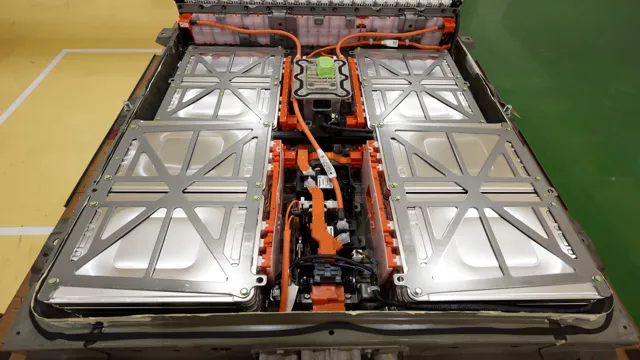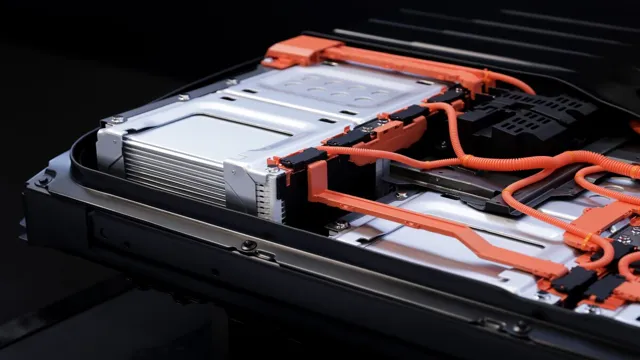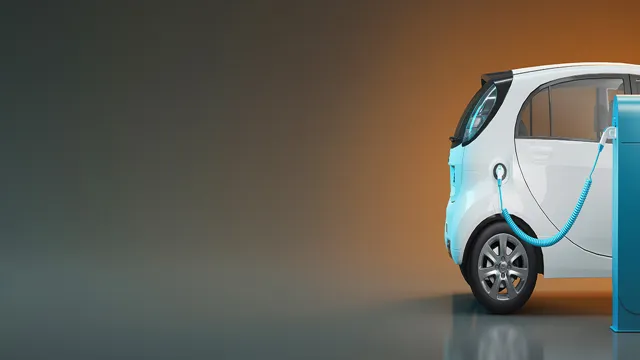The Shocking Truth: Electric Car Batteries May Be Doing More Harm Than Good for the Environment
Electric cars are becoming more and more popular, with many car manufacturers working on improving this technology. However, the biggest hurdle for most people when it comes to electric cars is the battery. Misconceptions and myths about the lifespan and effectiveness of electric car batteries are widespread, but what is the truth about these batteries? Are they really less effective than traditional car batteries? Are they much more expensive to replace? And what exactly is their lifespan? In this blog post, we will explore the ins and outs of electric car batteries, separating fact from fiction and answering commonly asked questions about them.
If you’re considering buying an electric car, or if you’re simply curious about electric car batteries, read on to discover what you need to know about electric car batteries, and learn why you shouldn’t believe everything you hear about them.
Battery Production and Mining
It is no secret that the production and mining of materials for electric car batteries have significant environmental impacts. The increased demand for electric vehicles has led to an increase in mining operations for materials such as lithium, cobalt, and nickel. These mining operations have resulted in soil and water pollution and toxic waste, leading to significant harm to ecosystems, wildlife, and local communities.
Additionally, the production of the batteries themselves requires significant amounts of energy, leading to increased greenhouse gas emissions. While electric vehicles offer benefits such as reduced emissions and improved fuel efficiency, it is important to acknowledge and address the environmental impacts of their battery production and mining operations. As consumers and manufacturers alike, it is our responsibility to work towards more sustainable and environmentally-focused solutions to meet our transportation needs.
Effects on Land and Water
When it comes to battery production and mining, the impact on the environment can be significant. Mining of materials used in battery production, such as lithium, cobalt, and nickel, can result in land degradation and water pollution. The extraction process can lead to deforestation, erosion, and habitat destruction.
Additionally, the chemicals used to extract these materials can contaminate nearby water sources and harm aquatic life. Battery production itself can also have negative effects, such as the release of greenhouse gases during manufacturing and distribution. Unfortunately, the demand for batteries is only growing, and as a result, the environmental impact may continue to worsen.
It is important for companies and governments to prioritize sustainable mining practices and invest in cleaner battery production methods to minimize the effects on the environment.

CO2 Emissions from Production
When we talk about electric vehicles and their environmental impact, we tend to focus on their lack of tailpipe emissions. However, it’s important to consider the CO2 emissions created during the production of their batteries. The production of lithium-ion batteries, which are commonly used in electric vehicles, requires significant amounts of energy and emits CO2 into the atmosphere.
In fact, studies have shown that the production of an electric car battery can generate up to 74% more emissions than the production of a traditional gasoline-powered engine. Additionally, the extraction of raw materials like lithium and cobalt for these batteries can also have negative environmental impacts. Mining activities can cause contamination of water and soil, habitat destruction, and displacement of indigenous communities.
It’s crucial that we address these issues and work towards more sustainable production methods for electric vehicle batteries.
Battery Disposal and Recycling
Many people believe that electric car batteries are destroying the environment due to their disposal and recycling process. However, the truth is that electric car batteries can be reused and recycled. While lithium-ion batteries used in electric cars are not completely recyclable, they still hold valuable components like cobalt, copper, and nickel.
Recycling companies aim to target these valuable components, reducing the need for mining, which is the primary cause of environmental damage. Moreover, electric car manufacturers like Tesla have invested in a closed-loop system, which means they recycle their own batteries and reuse the valuable components to create new batteries, reducing the need for mining and landfill waste. Hence, disposing of electric car batteries doesn’t have to be a threat to the environment.
With recycling centers and closed-loop systems, we can reduce carbon emissions and preserve valuable resources.
Impact on Landfills and Soil
Battery disposal and recycling play a crucial role in reducing the impact of landfills and soil contamination. Improper disposal of batteries, especially the ones that contain heavy metals, can lead to significant environmental consequences. These toxic metals can seep into the soil and contaminate local freshwater sources, leading to severe health issues.
Moreover, batteries do not decompose, and their disposal can take up valuable space in landfills. Recycling batteries can help reduce the amount of waste sent to landfills and also prevents the release of toxic metals into the environment. Many companies now provide battery recycling programs, making it easier for people to dispose of their batteries safely.
By recycling batteries, we can reduce our carbon footprint and help preserve the health of our planet. So, the next time you need to dispose of your old batteries, consider recycling them instead of throwing them in the trash.
Toxic Chemicals and Heavy Metals
Battery disposal and recycling is an important topic when it comes to dealing with toxic chemicals and heavy metals. Batteries are made up of various metals such as lead, cadmium, nickel, and lithium, which can be hazardous to the environment and human health if not handled properly. Improper disposal of batteries can lead to these metals leaching into the soil and water, creating pollution problems.
Therefore, it is crucial to reuse, recycle, and dispose of batteries in the correct manner. Recycling batteries involves the separation of the different metals, which can then be reused in the production of new batteries. Battery recycling not only prevents pollution but also conserves natural resources and reduces the need for mining new materials.
By properly recycling batteries, we can contribute to a cleaner and healthier environment for ourselves and future generations.
Challenges and Limitations of Recycling
When it comes to recycling, battery disposal and recycling poses a unique challenge. While batteries are small, they contain toxic chemicals that can cause harm to the environment and our health. Improper disposal can result in these harmful compounds contaminating the soil and groundwater.
Many recycling centers have difficulty handling batteries because they need to be sorted by chemistry and can also be prone to bursting if not handled properly. However, despite the challenges, recycling batteries is possible and necessary. With proper collection and recycling efforts, we can reduce the environmental impact of these essential devices and ensure the resources they contain can be reused.
It’s important for individuals to take responsibility for their old batteries and bring them to designated recycling centers to ensure they are disposed of and recycled in a safe and responsible manner. By doing so, we can make a significant difference in reducing waste and protecting our planet.
Comparing Overall Environmental Impact
There has been a lot of debate recently surrounding the overall environmental impact of electric car batteries. While some argue that the production and disposal of these batteries is harmful to the environment, others argue that they are actually a net positive compared to traditional gasoline-powered cars. One thing that is clear, however, is that the production of electric car batteries does require a significant amount of resources and energy.
That being said, the advantages of electric cars, such as lower emissions and reduced dependence on fossil fuels, make them a more sustainable choice in the long run. It’s important to weigh the pros and cons of both electric and traditional cars when considering their environmental impact.
Electric Cars vs Gasoline Cars
When it comes to comparing the overall environmental impact of electric cars versus gasoline cars, the difference is significant. Electric cars release no greenhouse gases or pollutants through their exhaust pipes, making them the cleaner option. Gasoline cars, on the other hand, emit toxic particles and carbon dioxide into the atmosphere, contributing to global warming and air pollution.
By choosing to drive an electric car, you can significantly reduce your carbon footprint and help protect the environment. Plus, electric cars are becoming more affordable and widely available, with a growing network of charging stations that make it easier than ever to switch to clean energy. So why not make the switch to electric and help protect the planet for generations to come?
Lifecycle Analysis of EVs and Batteries
A lifecycle analysis of electric vehicles (EVs) and batteries is crucial to determine their overall environmental impact. When comparing the impact of EVs with gasoline-powered vehicles, it’s important to consider the energy required to produce them. The production of an EV requires more energy than a gasoline-powered vehicle due to the manufacturing process of battery cells and the materials involved.
However, once in operation, an EV emits no pollution, while gasoline-powered vehicles emit harmful gases such as carbon dioxide, nitrogen oxides, and sulfur dioxide. Battery disposal can also have environmental impacts, but proper recycling can mitigate much of the potential risks. It’s important to note that the environmental impact of EVs and batteries can vary depending on factors such as the source of electricity used to charge the vehicles and the disposal practices of battery manufacturers.
Overall, the lifecycle analysis of EVs and batteries shows that despite the initial energy demands of production, they have a much lower environmental impact than gasoline-powered vehicles.
Conclusion: Sustainability and Innovation in EVs
They say every cloud has a silver lining, but in the case of electric car batteries, it seems that every innovation comes with its own set of challenges. While electric cars have been touted as the environmentally-friendly solution to the world’s carbon emissions problem, the batteries that power these vehicles have been accused of doing their fair share of harm to the environment. From the mining of rare earth metals to the disposal of toxic waste, it’s clear that electric car batteries are not without their environmental costs.
But let’s not throw the baby out with the bathwater just yet. Electric cars are still a significant step forward in the fight against climate change, and with continued investment in technology and infrastructure, we can work towards making them even more sustainable in the future. After all, as they say, where there’s a will, there’s a way – and the will to save our planet is stronger than ever.
FAQs
How do electric car batteries impact the environment?
Electric car batteries have the potential to harm the environment as they require the extraction of materials such as lithium, cobalt, and nickel, which can lead to the destruction of natural habitats and pollution in nearby water sources. Additionally, these materials can’t be recycled effectively yet, resulting in a buildup of waste.
What are the alternatives to electric car batteries?
One alternative is hydrogen fuel cell technology, which only emits water vapor and heat as byproducts. However, hydrogen fuel cell technology is still in its early stages of development and is facing challenges related to infrastructure and cost.
Are electric car batteries really greener than traditional gas-powered vehicles?
Although electric car batteries have the potential to reduce greenhouse gas emissions, their environmental impact depends on how the electricity used for charging is generated. If it is generated from fossil fuels, it might end up being even more harmful to the environment than traditional gas-powered vehicles.
How can the issue of electric car battery disposal be addressed?
The industry can start by investing in developing battery recycling technology. Additionally, regulations and policies can be created to make manufacturers responsible for the disposal and recycling of used batteries. This approach can help ensure the materials from used batteries are reused or disposed of responsibly, preventing them from ending in landfills or being released into the environment.




